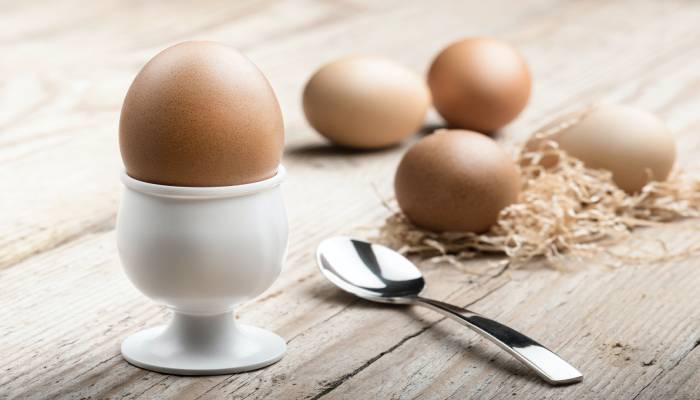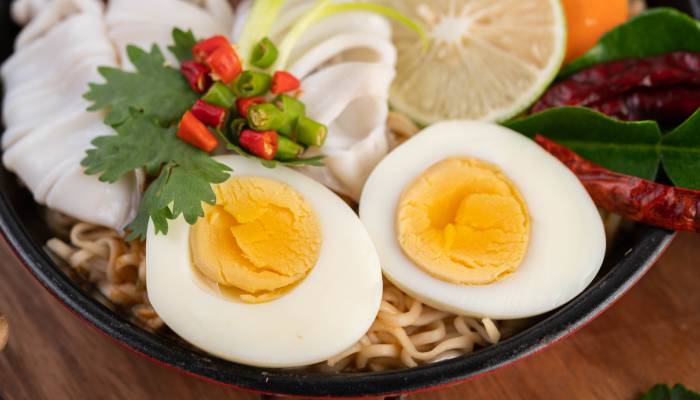On average, an egg contains between 55 and 80 calories in one egg, depending on its size. Eggs contain many vital vitamins and minerals, including calcium, potassium, iron, and a healthy protein source. These nutrients are all essential components of the diet of a human.
Calories in one egg
One big, hard-boiled egg contains approximately 78 calories in egg, according to the United States Department of Agriculture (USDA).
Due to concerns over saturated fats and cholesterol, eggs were once a controversial alternative, but studies have since shown that eggs have various dietary benefits.

This paper looks at the egg feeding profile and some of the current findings on the risks and benefits involved with egg consumption.
Proteins
For production, fitness, and repair, protein is essential. Hormones, enzymes, and antibodies need to be produced, too.
A single large egg contains 6.28 g of protein, and an egg white has 3.6 g. That’s a whole bunch of protein!
0.8 g of protein per kilogram (kg of body weight is the minimum daily intake for protein.
For example, about 51 g of protein a day is required by a person who weighs 140 pounds (63.5 kg). A single egg will provide approximately 12 percent of the daily protein needs of this person.
You can use this helpful USDA calculator to determine how much protein you need to keep healthy each day.
Fats
About half of an egg’s calories come from fat. There is a little less than 5 g of fat in one big egg contained in the egg yolk. 1.6 g or so is saturated fat.
Safe omega-3 fatty acids also contain egg yolks. Omega-3 fatty acids help minimize the body’s inflammation. They can reduce the risk of chronic diseases such as heart disease, asthma, and cancer.
In the brain, they are heavily distributed and be important for comprehension and memory.
Cholesterol
You may have learned that there is a lot of cholesterol in egg yolks. There are 186 milligrams (mg) of cholesterol in the typical broad egg.
Because of the cholesterol content, it is a common belief that eggs are “bad for you.” Cholesterol is not always bad. Cholesterol serves many vital functions in the body. Without having a problem with their cholesterol levels, most individuals will eat an egg or two every day.
You should also eat eggs in moderation (four to six a week without any complications if your cholesterol is elevated or you have diabetes. Be sure, though, that you do not ingest other foods rich in saturated fat, trans fat, or cholesterol regularly.
Carbohydrates
There are very few carbohydrates in eggs, with just .36 g per large shell. They aren’t a type of fiber or sugar.
Profile in Diet

According to the USDA, one large, hard-boiled egg weighing about 50 grams(g) contains the following nutrients:
- 78 Calories
- Protein: 6.29 grams
- Fat total: 5.3 g
- Carbohydrate: 0.56 g
- Fiber for diet: 0 g
- Sugars: 0.56 gram
- Calcium: (25 milligrams)
- Iron: (0.59 milligrams)
- phosphorous: (86 milligrams)
- potassium (63 mg)
- Zinc: (0.53 mg.)
- Cholesterol: (186 mg)
- Folate: (Twenty-two micrograms)
- Vitamin A: 260 units of international (IU)
- Vitamin D: IU 44
The way a human cooks an egg, however, changes its nutritional profile slightly. According to the USDA, for instance, the same 50 g of a whole scrambled egg has about 4.99 g of protein and 36 IU of vitamin D.
Advantages
Eggs are a healthy source of protein, fatty acids, choline, and antioxidants, and they have many advantages. Eggs are also high in vitamin D, a mineral in many popular foods that do not exist naturally.
As part of the regular diet, numerous clinical trials have evaluated the nutritional importance of eggs.
E.g., 26 participants, ages 60-75, with obesity were included in one study in The FASEB Journal. The researchers challenged them for 8 weeks to consume either an egg-dependent, high-fat diet or a low-fat diet dependent on carbohydrates.
The scientists measured the body fat content of the participants after 8 weeks. Those who ate three entire eggs a day lose more weight on a low carbohydrate diet than those who ate low fat, high carbohydrate diet.
It is, however, necessary to remember that the Egg Nutrition Centre sponsored this research.
Seven clinical findings surrounding egg intake, heart disease, and stroke were discussed in a meta-analysis in the American College of Nutrition Journal.
The researchers found that consuming up to one egg a day helped minimize the risk of stroke in an individual, but they did not see an improvement or a decrease in the risk of heart disease in the participants.
However, one research in the journal Heart, containing evidence from half a million people, showed that consuming an average of one egg a day was substantially correlated with a lower risk of heart disease.
The results of a high egg diet and a low egg diet in people with diabetes were investigated in a report in The American Journal of Clinical Nutrition. The team described a high diet for eggs as eating two eggs a day 6 days a week and a low diet for eggs as eating less than two eggs a week.
After 3 months, the researchers found that the participants’ cholesterol levels were not influenced by high egg intake. However, they observed that a high diet of eggs would improve satiety or feelings of fullness.
Eggs can be a balanced dietary addition. An individual should integrate them into a variety of meals to enjoy nutritional advantages.
What are the health benefits of eggs

Eating one egg a day has been proven to be healthy for most individuals. It contains 13 essential vitamins and minerals, such as fat-soluble vitamin A, vitamin E, vitamin D, vitamin K, choline, a necessary nutrient for fetal growth during pregnancy, and eye-conserving antioxidants lutein and zeaxanthin. It provides a satiating combination of both protein and fat.
And individuals with type 2 diabetes who have a higher chance of having heart disease will eat eggs safely. One study looked at adults with type 2 diabetes or prediabetes and found that people on a high-egg-consumption weight loss diet for three months didn’t experience any negative effects on their cholesterol levels or inflammation markers.
Your Metabolism can Improve Eggs
Both essential amino acids are found in eggs and the correct ratios. This ensures the protein in eggs can quickly be used by your body for maintenance and metabolism.
In a phenomenon called the thermal effect of food, eating a high-protein diet has improved metabolism by up to 80-100 calories a day.
The thermal effect of food is the energy needed for food metabolization by the body. It is more significant for protein than for fat or carbs.
This ensures that high-protein foods help you consume more calories, such as eggs.
HOW MANY CALORIES IN A CHICKEN WING? BREAST, THIGH, WING AND MORE
Eggs are a perfect way to get your day started
It appears to be extremely helpful for weight loss to consume eggs for breakfast.
The results of consuming eggs in the morning and eating other breakfasts of the same calorie content have been compared in several studies.
Several studies of overweight women found that consuming eggs instead of bagels improved their sense of fullness for the next 36 hours and allowed them to consume fewer calories.
It has also been shown that egg breakfasts cause up to 65 percent greater weight loss in 8 weeks.
Related research in men came to the same conclusion, finding that, relative to a bagel breakfast, an egg breakfast substantially decreased calorie consumption for the next 24 hours. The egg eaters looked fuller as well.
Besides, the egg breakfast triggered healthier blood glucose and insulin reaction while still suppressing ghrelin (the appetite hormone).
The results of three breakfast forms on three different occasions were compared in another survey of 30 stable and fit young men. There were toast eggs, milk and toast cereals, and an orange juice croissant.
The egg breakfast caused considerably more pleasure, reduced appetite, and a weaker desire to consume than the other two breakfasts.
In comparison, consuming breakfast eggs led men to eat between 270-470 calories less at lunch and dinner buffets immediately, relative to eating the other breakfasts.
This remarkable drop was accidental and effortless in calorie consumption. Eating eggs for breakfast was the only thing they did.
Eggs are easy to cook and inexpensive
It is effortless to integrate eggs into your diet.
- They are cheap, readily available, and can be prepared in a matter of minutes.
- Almost any way you make eggs are delicious, but they are most commonly fried, scrambled, turned into an omelet, or cooked.
- A breakfast omelet made with a few eggs and some vegetables make a friendly breakfast for tremendous and easy weight loss.
- On this list, you can find plenty of egg recipes to try.
The Risks
The cholesterol level in egg yolk has been implicated in recent debates about eggs and their nutritional importance. One big egg contains approximately 186 mg of cholesterol, according to the American Heart Association (AHA).
Nevertheless, in 2016, the secretaries of the US Department of Health and Human Services and the USDA abolished the prescribed daily cholesterol limit.
This was accompanied by advice from nutritional advisory boards, who acknowledged that evidence has not found that dietary cholesterol presents a risk to heart function or cholesterol levels in the body in foods such as eggs.
A 2019 research in the journal Nutrients most recently found reasons to support the omission, concluding that eating eggs is not correlated with the body’s elevated cholesterol levels. The findings are based on the Hellenic National and Nutrition Health Survey, which asked questions about their eating patterns from more than 3,500 participants.
Suppose a person usually has a balanced diet and is conscious of their daily intake of foods high in saturated fat, trans fat, and cholesterol. In that case, it is unlikely that consuming cooked eggs will affect their health.
A more significant concern about egg consumption is that, particularly among kids, allergies are widespread. About 2 percent of children are allergic to eggs, according to the American College of Allergy, Asthma & Immunology.
Although many outgrow this allergy before the age of 16, some individuals encounter symptoms that are so extreme that they cause breathing difficulties.
Most of the egg allergy-related symptoms include
- Coughing Normally
- Diarrheal Infection
- Dizziness, vertigo
- A sensation of tightness in your throat
- Cramping in the stomach
- Swelling of the tongue and mouth
They can get medical attention if they believe that they know they have an allergic reaction to eggs.
To treat an anaphylactic reaction’s effects, people with serious egg allergies will need to bring an epinephrine injector pen.
Dieting and Eggs

If you’re looking to lose weight and ensuring your body receives all the necessary nutrients it needs, eggs are the perfect food to include in your diet. Since eggs are nutritionally rich and have less than 70 (medium-sized) calories, they can be part of most meals and snacks that are calorie-controlled while also offering plenty of protein and essential vitamins, minerals, and fats.
Of course, the way you cook your eggs will influence the nutritional content. For example, if you fried an egg in fat, this would raise the total calories instead of boiling it. It is also essential to eat your eggs and other nutrient-rich foods, such as vegetables, salads, and whole grains.
How many calories are in 1 fried egg

It depends on whether fat or oil or butter is dry-fried or fried. Such samples are here:
92 to 100 calories in a giant egg with the least amount of added fat or oil
Seventy-eight calories in one big dry fried (no added fat) egg.
Further dry-fried examples are here:
54 calories in egg 1 small dry fried.
63 calories in egg 1 dry fried medium-size
78 calories in the egg for one big dry fried.
How many calories is a fried egg on toast
75 calories in egg giant fried on toast with the least amount of added fat or oil
75 calories in one big dry fried egg on toast (no added fat) egg.
How to make you lose weight by eating eggs

It’s no coincidence that eggs are most commonly eaten at breakfast, even if you can eat eggs at any time of day. Good overweight or obese adults who consume eggs as part of a weight-loss diet for eight weeks shed 65 percent more weight than the bagel eaters in classic research looking at equal-calorie egg or bagel breakfasts.
The later study supports the notion that a conventional carb-y breakfast should be exchanged for a protein-rich egg one. A small sample of men aged 20 to 70 showed that those who consumed an egg breakfast consumed fewer calories during the day than men who ate a bagel breakfast, possibly because hunger hormones were reduced by eggs and comfort increased.
How to pick and store eggs and taste for the highest quality

Eggs from the refrigerated case can be bought. (Because of varying manufacturing methods, that is the rule in the United States, but not in Europe.) Turn the carton open to ensure the eggs are clean and none are broken and do not buy expired cartons, the Egg Protection Centre recommends.
They are placing eggs in their original carton in the refrigerator right away when you get home. Within three weeks, make sure to feed them. Here’s how another egg-label lingo can be deciphered:
White vs. brown eggs
Time to lay to rest the misconception that brown eggs are better. They’re both the same — the shell color isn’t an indication of the egg’s taste or nutrition. It all depends on the coloring of the hen. For instance, birds with white feathers lay white eggs. The color you choose is your preference.
Pasteurized eggs
These are eggs that have been treated to destroy salmonella. You can buy these in their shell (it will say “pasteurized” on the carton) or as a liquid pasteurized egg product. You’d want to use these if you’re making a dish that uses undercooked eggs. Homemade Caesar dressing is one example.
Cage-free eggs
These hens have access to an open area or can move about a barn or poultry house.
Free-range and pasture-fed egg
Access to the outdoors is required for the flock.
Organic eggs
Hens will roam indoors and outside and are uncaged. In line with the United States, they also consume feed free from traditional pesticides and fertilizers. Global Organic Initiative from the Department of Agriculture.
Raw eggs
All eggs are natural, as the USDA notes; they have nothing added to them.
In your home kitchen, all the ways that you can Cook eggs
One of the great things about eggs is their versatility in dishes, which means that as long as you mess around with preparations, they don’t have to get boring, including:
- Scrambled Over
- Hard-boiled
- Fried
- Frittatas and omelettes
- Poached.
Remember: It is advised that eggs be fried until solid, not runny, to minimize potential foodborne illness. For example, fried eggs are ordered or cooked over hard, not over simple.
Other ways you can use eggs
Added as a binder to casseroles (and to improve the protein)
In the crab and fish cakes/burgers, as a binder again
To soak bread for French toast or soups for French toast
Eggnog and homemade ice cream (heat the egg mixture first)
- Meringue In
- Devilled
- Salad of Eggs
- Atop a Cup of Grain
- For your pasta in carbonara sauce
- Poached in sauce with tomatoes (shakshuka)
- Hard-boiled and salad
- Cooked soup atop
- Out with fried rice
- Tacos for breakfast
READ THIS NEXT
How to Lose 30 Pounds in 2 Months
How to Lose 15 Pounds in a Month
Top 25 Full Body Workout Every day At Home
